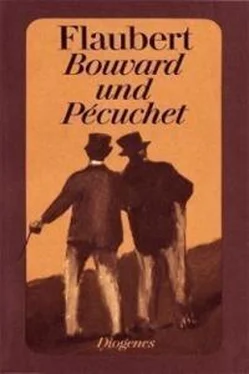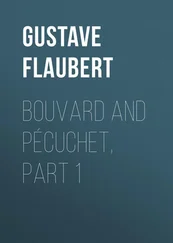Through need of the dramatic element, they plunged into romances of adventure. The more entangled, extraordinary, and impossible the plot was, the more it interested them. They did their best to foresee the dénouement , became very excited over it, and tired themselves out with a piece of child's play unworthy of serious minds.
The work of Balzac amazed them like a Babylon, and at the same time like grains of dust under the microscope.
In the most commonplace things arise new aspects. They never suspected that there were such depths in modern life.
"What an observer!" exclaimed Bouvard.
"For my part I consider him chimerical," Pécuchet ended by declaring. "He believes in the occult sciences, in monarchy, in rank; is dazzled by rascals; turns up millions for you like centimes; and middle–class people are not with him middle–class people at all, but giants. Why inflate what is unimportant, and waste description on silly things? He wrote one novel on chemistry, another on banking, another on printing–machines, just as one Ricard produced The Cabman , The Water–Carrier and The Cocoa–Nut Seller . We should soon have books on every trade and on every province; then on every town and on the different stories of every house, and on every individual—which would be no longer literature but statistics or ethnography."
The process was of little consequence in Bouvard's estimation. He wanted to get information—to acquire a deeper knowledge of human nature. He read Paul de Kock again, and ran through the Old Hermits of the Chaussée d'Antin .
"Why lose one's time with such absurdities?" said Pécuchet.
"But they might be very interesting as a series of documents."
"Go away with your documents! I want something to lift me up, and take me away from the miseries of this world."
And Pécuchet, craving for the ideal, led Bouvard unconsciously towards tragedy.
The far–off times in which the action takes place, the interests with which it is concerned, and the high station of its leading personages impressed them with a certain sense of grandeur.
One day Bouvard took up Athalie , and recited the dream so well that Pécuchet wished to attempt it in his turn. From the opening sentence his voice got lost in a sort of humming sound. It was monotonous and, though strong, indistinct.
Bouvard, full of experience, advised him, in order to render it well–modulated, to roll it out from the lowest tone to the highest, and to draw it back by making use of an ascending and descending scale; and he himself went through this exercise every morning in bed, according to the precept of the Greeks. Pécuchet, at the time mentioned, worked in the same fashion: each had his door closed, and they went on bawling separately.
The features that pleased them in tragedy were the emphasis, the political declamations, and the maxims on the perversity of things.
They learned by heart the most celebrated dialogues of Racine and Voltaire, and they used to declaim them in the corridor. Bouvard, as if he were at the Théâtre Français, strutted, with his hand on Pécuchet's shoulder, stopping at intervals; and, with rolling eyes, he would open wide his arms, and accuse the Fates. He would give forth fine bursts of grief from the Philoctète of La Harpe, a nice death–rattle from Gabrielle de Vergy , and, when he played Dionysius, tyrant of Syracuse, the way in which he represented that personage gazing at his son while exclaiming, "Monster, worthy of me!" was indeed terrible. Pécuchet forgot his part in it. The ability, and not the will, was what he lacked.
On one occasion, in the Cléopâtre of Marmontel, he fancied that he could reproduce the hissing of the asp, just as the automaton invented for the purpose by Vaucanson might have done it. The abortive effort made them laugh all the evening. The tragedy sank in their estimation.
Bouvard was the first to grow tired of it, and, dealing frankly with the subject, demonstrated how artificial and limping it was, the silliness of its incidents, and the absurdity of the disclosures made to confidants.
They then went in for comedy, which is the school for fine shading. Every sentence must be dislocated, every word must be underlined, and every syllable must be weighed. Pécuchet could not manage it, and got quite stranded in Celimène . Moreover, he thought the lovers very cold, the disputes a bore, and the valets intolerable—Clitandre and Sganarelle as unreal as Ægistheus and Agamemnon.
There remained the serious comedy or tragedy of everyday life, where we see fathers of families afflicted, servants saving their masters, rich men offering others their fortunes, innocent seamstresses and villainous corrupters, a species which extends from Diderot to Pixérécourt. All these plays preaching about virtue disgusted them by their triviality.
The drama of 1830 fascinated them by its movement, its colouring, its youthfulness. They made scarcely any distinction between Victor Hugo, Dumas, or Bouchardy, and the diction was no longer to be pompous or fine, but lyrical, extravagant.
One day, as Bouvard was trying to make Pécuchet understand Frédéric Lemaître's acting, Madame Bordin suddenly presented herself in a green shawl, carrying with her a volume of Pigault–Lebrun, the two gentlemen being so polite as to lend her novels now and then.
"But go on!" for she had been a minute there already, and had listened to them with pleasure.
They hoped she would excuse them. She insisted.
"Faith!" said Bouvard, "there's nothing to prevent―"
Pécuchet, through bashfulness, remarked that he could not act unprepared and without costume.
"To do it effectively, we should need to disguise ourselves!"
And Bouvard looked about for something to put on, but found only the Greek cap, which he snatched up.
As the corridor was not big enough, they went down to the drawing–room. Spiders crawled along the walls, and the geological specimens that encumbered the floor had whitened with their dust the velvet of the armchairs. On the chair which had least dirt on it they spread a cover, so that Madame Bordin might sit down.
It was necessary to give her something good.
Bouvard was in favour of the Tour de Nesle . But Pécuchet was afraid of parts which called for too much action.
"She would prefer some classical piece! Phèdre , for instance."
"Be it so."
Bouvard set forth the theme: "It is about a queen whose husband has a son by another wife. She has fallen madly in love with the young man. Are we there? Start!
"'Yes, prince! for Theseus I grow faint, I burn—
I love him!'" [9] Oui, prince, je languis, je brûle pour Thésée—Je l'aime!
And, addressing Pécuchet's side–face, he gushed out admiration of his port, his visage, "that charming head"; grieved at not having met him with the Greek fleet; would have gladly been lost with him in the labyrinth.
The border of the red cap bent forward amorously, and his trembling voice and his appealing face begged of the cruel one to take pity on a hopeless flame.
Pécuchet, turning aside, breathed hard to emphasise his emotion.
Madame Bordin, without moving, kept her eyes wide open, as if gazing at people whirling round; Mélie was listening behind the door; Gorju, in his shirt–sleeves, was staring at them through the window. Bouvard made a dash into the second part. His acting gave expression to the delirium of the senses, remorse, despair; and he flung himself on the imaginary sword of Pécuchet with such violence that, slipping over some of the stone specimens, he was near tumbling on the ground.
"Pay no attention! Then Theseus arrives, and she poisons herself."
Читать дальше








![Гюстав Флобер - Закат Карфагена [Сборник]](/books/414440/gyustav-flober-zakat-karfagena-sbornik-thumb.webp)


